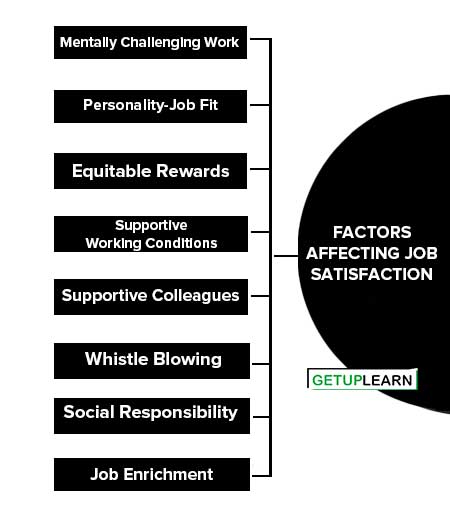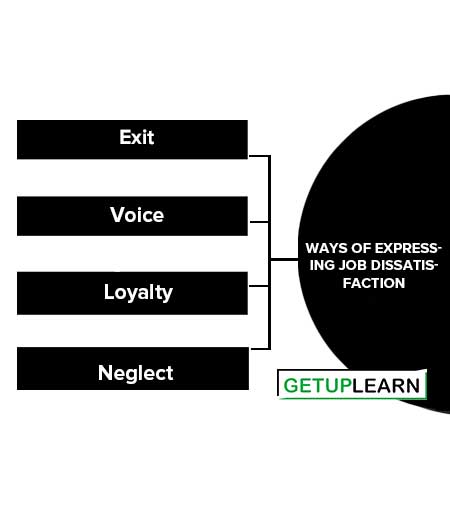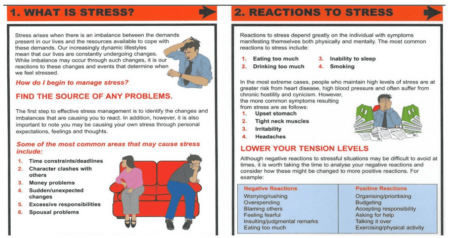Table of Contents
What is Job Satisfaction?
Job satisfaction is the sense of fulfillment and pride felt by people who enjoy their work and do it well. For an organization, a satisfied workforce ensures commitment to high-quality performance and increased productivity.
Job satisfaction helps organizations to reduce complaints and grievances, absenteeism, turnover, and termination. Job satisfaction is also linked to a healthier workforce and has been found to be a good indicator of longevity.
And although only little correlation has been found between job satisfaction and productivity, it has also been found that satisfying or delighting employees is a prerequisite to satisfying or delighting customers, thus protecting the “bottom line (Brown, 1996).
Factors Affecting Job Satisfaction
The most important factors affecting job satisfaction are:
- Mentally Challenging Work
- Personality-Job Fit
- Equitable Rewards
- Supportive Working Conditions
- Supportive Colleagues
- Whistle Blowing
- Social Responsibility
- Job Enrichment

Mentally Challenging Work
Employees tend to prefer jobs that give them opportunities to use their skills and abilities and offer a variety of tasks, freedom, and feedback on how well they are doing. Under conditions of moderate challenge, most employees will experience pleasure and satisfaction.
Personality-Job Fit
People with personality types congruent with their chosen vocations should find they have the right talents and abilities to meet the demands of their jobs; and because of this success, they have a greater probability of achieving high satisfaction from their work. It is important, therefore, to fit personality factors with job profiles.
Equitable Rewards
Employees want pay systems and promotion policies that they perceive as being just, unambiguous, and in line with their expectations. When pay is seen as fair based on job demands, individual skill level, and industry pay standards, satisfaction is likely to result.
Similarly, employees seek fair promotion policies and practices. Promotions provide opportunities for personal growth, more responsibilities, and increased social status. Individuals who perceive that promotion decisions are made in a fair and just manner are likely to experience job satisfaction.
Supportive Working Conditions
Employees prefer physical conditions that are comfortable and facilitate doing a good job. Temperature, light, noise, and other environmental factors should not be extreme and provide personal comfort. Further, employees prefer working relatively close to home, in clean and relatively modern facilities, and with adequate tools and equipment.
Supportive Colleagues
Employees have a need for social interaction Therefore, having friendly and supportive co-workers and understanding supervisors leads to increased job satisfaction.
Most employees want their immediate supervisor to be understanding and friendly, offer praise for good performance, listen to employees’ opinions, and show a personal interest in them.
Whistle Blowing
Whistle-blowers are employees who inform authorities of wrongdoings of their companies or co-workers. Whistle-blowing is important because committed organizational members sometimes engage in unethical behavior in an intense desire to succeed.
Organizations can manage whistle-blowing by communicating the conditions that are appropriate for the disclosure of wrongdoing. Clearly delineating wrongful behavior and the appropriate ways to respond are important organizational actions.
Corporate social responsibility is the obligation of an organization to behave in ethical ways in the social environment in which it operates. Socially responsible actions are expected of organizations.
Current concerns include protecting the environment, promoting worker safety, supporting social issues, investing in the community, etc. Managers must encourage both individual ethical behavior and organizational social responsibility.
Job Enrichment
It is a deliberate upgrading of responsibility, scope, and challenge in the work itself. Job enrichment usually includes increased responsibility, recognition, and opportunities for growth, learning, and achievement. Large companies that have used job-enrichment programs to increase employee motivation and job satisfaction include AT&T, IBM, and General Motors (Daft, 1997).
Worker’s Role in Job Satisfaction
A worker should also take some responsibility for his or her job satisfaction. Everett (1995) proposed the following questions that employees ask themselves in regard to job satisfaction at the workplace.
- When have I come closest to expressing my full potential in a work situation?
- What did it look like?
- What aspects of the workplace were most supportive?
- What aspects of the work itself were most satisfying?
- What did I learn from that experience that could be applied to the present situation?
Further suggestions can help a worker find personal job satisfaction:
- Geek opportunities to demonstrate skills and talents.
- Develop communication skills.
- Acquire job-related skills and try to implement them.
- Demonstrate creativity and initiative.
- Improve team building and leadership skills.
- Learn to de-stress
Ways of Expressing Job Dissatisfaction
Job dissatisfaction is a negative feeling about one’s job resulting from an evaluation of its characteristics. Job dissatisfaction is a reality in the workplace. The responses to job dissatisfaction according to Farrell (1983) are exit, voice, loyalty, and neglect.
In 2005, Robbins and Judge stated that job dissatisfaction is concerned with factors such as company policy, administration, supervision, and salary. Since there are no perfect organizations, it is reasonable to state that high levels of dissatisfaction exist for some firms. There are a number of ways in which employees can express dissatisfaction (Robbins, 2003). They are:

Exit
Behavior directed toward leaving the organization, actions like looking for a new position as well as resigning.
Voice
Actively and constructively attempting to improve conditions, including suggesting improvements, discussing problems with superiors, and some forms of union activity.
Loyalty
Passively, but optimistically waiting for conditions to improve, including standing up for the organization in the face of external criticism/crisis, and reposing trust in the organization and its management to take the right decisions and set things in order.
Neglect
Passively allowing conditions to worsen, including chronic absenteeism or lateness, reduced effort, and increased error rate.
FAQs Section
What are the factors affecting job satisfaction?
The following are the factors affecting job satisfaction:
1. Mentally Challenging Work
2. Personality-Job Fit
3. Equitable Rewards
4. Supportive Working Conditions
5. Supportive Colleagues
6. Whistle Blowing
7. Social Responsibility
8. Job Enrichment.

